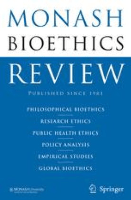
Monash Bioethics Review
Scope & Guideline
Bridging Disciplines to Tackle Contemporary Ethical Challenges
Introduction
Aims and Scopes
- Interdisciplinary Bioethics:
The journal integrates perspectives from philosophy, law, public health, and social sciences to address bioethical issues, reflecting the multifaceted nature of ethical dilemmas in healthcare. - Focus on Contemporary Issues:
It emphasizes current ethical challenges, particularly those arising from technological advancements, public health crises, and evolving medical practices. - Global and Local Perspectives:
The journal explores both global bioethical concerns and localized issues relevant to specific communities, enhancing the dialogue between diverse cultural and ethical viewpoints. - Emphasis on Justice and Equity:
There is a consistent focus on themes of justice, equity, and social responsibility, particularly in relation to healthcare access and resource allocation. - Engagement with Policy and Practice:
The journal not only critiques ethical theories but also engages with practical implications for healthcare policy and clinical practice, aiming to influence real-world applications.
Trending and Emerging
- Public Health Ethics in Crisis Situations:
The COVID-19 pandemic has propelled public health ethics to the forefront, with a focus on coercion, vaccine distribution, and the ethical implications of lockdown measures. - Technological Implications for Bioethics:
Emerging technologies, such as AI and genetic engineering, are increasingly scrutinized for their ethical implications, particularly in areas like informed consent and the treatment of simulated beings. - Environmental and Global Health Ethics:
There is a growing emphasis on the intersection of environmental issues and health, particularly in discussions around climate change, antimicrobial resistance, and social justice. - Justice and Equity in Healthcare Access:
The journal is increasingly addressing issues of distributive justice and equity in healthcare, emphasizing the need for fair resource allocation and consideration of marginalized populations. - Ethical Frameworks for Emerging Public Health Issues:
New frameworks are being developed to address complex issues such as antibiotic resistance, reproductive justice, and ethical dilemmas in chronic illness management.
Declining or Waning
- Traditional Ethical Debates:
Long-standing debates surrounding classical bioethical issues, such as euthanasia and reproductive rights, are receiving less emphasis as newer, more pressing ethical challenges emerge. - Military Bioethics:
Topics specifically related to military ethics, such as the ethical implications of military medical practices and enhancement technologies, have seen a decline, possibly due to shifting focus towards civilian healthcare issues. - Historical Ethical Analyses:
The exploration of historical perspectives on bioethical principles, such as studies on the Belmont Report, is less common, indicating a movement towards addressing contemporary issues rather than historical context. - Niche Ethical Concerns:
Certain niche areas of bioethics, such as those focusing solely on specific diseases or conditions, are being overshadowed by broader discussions that encompass wider social and ethical implications. - Philosophical Disputes without Practical Implications:
There is a waning interest in purely philosophical debates that do not yield practical applications in healthcare or public policy, as the journal seeks to maintain relevance in the field.
Similar Journals
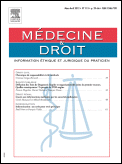
Medecine & Droit
Shaping the Future of Medicine with Legal ExpertiseMedecine & Droit, an esteemed journal published by ELSEVIER MASSON, CORP OFF, serves as a vital resource for the intersection of law and medicine. Since its inception in 1995, this journal has facilitated scholarly discourse by publishing innovative research, case studies, and reviews that explore the complexities of legal frameworks impacting medical practice and public health. Although currently classified in the fourth quartile within both the Law and Medicine (miscellaneous) categories for 2023, its contributions are important for legal professionals and healthcare providers seeking to navigate the evolving landscape of medical laws. With an ISSN of 1246-7391 and E-ISSN 1873-6475, it provides essential insights and stimulates interdisciplinary collaboration within academia. Authors and researchers are encouraged to contribute and engage with critical topics shaping the future of medicine and law through this essential publication.

Canadian Journal of Bioethics-Revue Canadienne de Bioethique
Advancing ethical discourse in healthcare.Canadian Journal of Bioethics-Revue Canadienne de Bioethique, published by the Universite de Montreal, is a premier open-access journal dedicated to advancing the multidisciplinary field of bioethics since 2012. Emphasizing the complexities of ethical practices in health policy, it serves as a vital resource for researchers, professionals, and students engaged in health and philosophy. With its E-ISSN 2561-4665, the journal's content is freely accessible, fostering knowledge dissemination and academic collaboration. Although categorized in Q4 among Health Policy and Health (social science) in 2023, it holds a respectable Q2 status in Philosophy, reflecting its strong theoretical contributions. Covering a wide scope from 2018 to 2024, the journal encourages robust discourse on pressing ethical issues facing contemporary healthcare systems. For those seeking to connect with the evolving narratives in bioethics, this journal is indispensable.
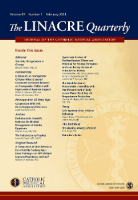
Linacre Quarterly
Exploring Ethical Dimensions in Health PolicyLinacre Quarterly, published by SAGE Publications Inc, is a distinguished journal that serves as an interdisciplinary platform in the fields of Health Policy and Philosophy. With an ISSN of 0024-3639 and an E-ISSN of 2050-8549, this journal has been pivotal in providing insights into the intricate dynamics of health policy through a philosophical lens since its inception in 1945. Notably, it holds a respectable 2023 Scopus rank, placing it in the 68th percentile within the Arts and Humanities (Philosophy) category and the 21st percentile in Medicine (Health Policy). Though currently not offering Open Access options, Linacre Quarterly remains committed to advancing scholarly discussion and fostering innovation among researchers, professionals, and students alike. Located in the United Kingdom, this journal continues to uphold its reputation as a vital resource for those navigating the complexities of health-related ethical dilemmas and policy-making frameworks, thereby enhancing its visibility and relevance in academic discourse.

Journal of Practical Ethics
Advancing Ethical Discourse Across DisciplinesJournal of Practical Ethics is an esteemed open-access journal published by the Oxford Uehiro Centre for Practical Ethics, dedicated to enhancing the discourse surrounding ethical issues in various fields, including healthcare, technology, and social policy. Since its inception in 2013, the journal has fostered a robust academic platform for researchers, professionals, and students to explore and publish innovative ideas and solutions to real-world ethical dilemmas. The journal's commitment to making research freely accessible emphasizes its role in bridging the gap between academic inquiry and practical application, thereby encouraging a broader engagement with ethical considerations across disciplines. As the importance of ethical frameworks continues to grow in an increasingly complex world, the Journal of Practical Ethics stands as a vital resource for those seeking to influence policy and practice through rigorous ethical analysis.

Acta Bioethica
Bridging Cultures through Ethical Inquiry in HealthActa Bioethica is a pivotal open access journal published by the Universidad de Chile's Centro Interdisciplinario de Estudios Bioética, dedicated to the multidisciplinary exploration of bioethical issues in health policy and social sciences. Since its inception in 2000, the journal has fostered dialogue among researchers, professionals, and students, addressing the complexities of ethical practices in diverse health contexts. With an impressive commitment to accessibility, Acta Bioethica has become a vital resource for those engaged in understanding the ethics of healthcare in Latin America and beyond. Although currently ranked in the lower quartiles of Scopus in both health policy and social sciences, the journal is steadily gaining recognition for its unique contributions to bioethics. The journal accepts contributions in both English and Spanish, ensuring a wider reach and impact in the academic community. Located in Santiago, Chile, and active from 2007 to 2024, Acta Bioethica continues to be an essential platform for advancing research and discussions in the ever-evolving field of bioethics.
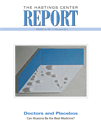
HASTINGS CENTER REPORT
Pioneering discussions on health ethics and philosophy.The HASTINGS CENTER REPORT, published by WILEY, is a leading journal in the fields of bioethics, health policy, and the philosophical underpinnings of healthcare. Established in 1971, this influential publication provides a critical platform for the discussion of ethical issues in health, medicine, and biotechnology, highlighting the intersection between ethical theory and practical health challenges. The journal achieves remarkable academic stature, achieving Q1 rankings in both Issues, Ethics and Legal Aspects and Philosophy, alongside Q2 standings in Health Policy and Health (social science) categories, reflecting its broad interdisciplinary impact. With its wide readership and rigorous peer-review process, the HASTINGS CENTER REPORT serves as an essential resource for researchers, practitioners, and students dedicated to advancing ethical perspectives in health-related discourse. While the journal operates under traditional access options, its contributions resonate deeply within the academic community, fostering informed dialogue on pressing ethical dilemmas and policy considerations in a rapidly evolving healthcare landscape.
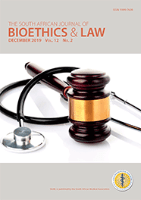
South African Journal of Bioethics and Law
Advancing dialogue at the nexus of bioethics and legal scholarship.South African Journal of Bioethics and Law, published by HEALTH & MEDICAL PUBLISHING GROUP, stands as a vital academic platform for discussions at the intersection of bioethics and legal studies. With an ISSN of 1999-7639, this journal has embraced an Open Access model since 2008, ensuring global accessibility for researchers, practitioners, and students alike. Based in South Africa, the journal operates from PRIVATE BAG X1, PINELANDS, CAPE TOWN 7430, and features diverse articles that span a multitude of pertinent topics across health professions, law, and public health. It proudly holds a Q3 ranking in Health Professions and Law sectors, affirming its status within the scholarly community. Notably, for the year 2023, it has achieved impressive placements in Scopus ranks, reinforcing its commitment to disseminating high-quality research and fostering dialogues that influence policy and practice in these critical domains. Researchers exploring the intricate ethical and legal dimensions of healthcare will find this journal an indispensable resource.

Christian Bioethics
Navigating Ethical Frontiers Through a Christian LensChristian Bioethics is a pivotal journal published by Oxford University Press, dedicated to the interdisciplinary exploration of bioethical issues from a Christian perspective. Since its inception in 1995, the journal has served as a crucial platform for scholars, practitioners, and students to engage with complex ethical questions at the intersection of medicine, philosophy, and religious studies. With an evolving scope that reflects contemporary debates in bioethics, the journal has achieved notable rankings, including Q2 in Religious Studies and Q3 in Philosophy in 2023, underscoring its significance in these fields. While not open access, Christian Bioethics continues to bridge gaps between faith and science, encouraging rigorous dialogue on how Christian ethics can inform bioethical decision-making and policy. It is essential reading for those looking to deepen their understanding of ethical issues shaped by religious convictions, making it an invaluable resource for researchers and professionals alike.
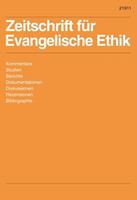
ZEITSCHRIFT FUR EVANGELISCHE ETHIK
Fostering Interdisciplinary Dialogues in Evangelical ThoughtZEITSCHRIFT FUR EVANGELISCHE ETHIK, published by WALTER DE GRUYTER GMBH, is a leading journal in the field of Religious Studies, noted for its critical examination of evangelical ethics and theological perspectives. With an ISSN of 0044-2674 and E-ISSN of 2197-912X, this journal serves as a pivotal platform for scholars seeking to explore contemporary issues through a rigorous ethical lens. Based in Germany, it engages readers with a rich tapestry of interdisciplinary insights, contributing significantly to ongoing discussions within the realm of religious ethics. The journal enjoys a commendable position in the Scopus rankings, placed in the Q3 quartile and ranking #476 out of 644 in its category, reflecting its dedication to quality scholarship. Spanning over two decades, with converged years from 2002 to 2024, it fosters valuable dialogues between researchers, professionals, and students alike. Although not Open Access, the journal's subscription options ensure accessibility to essential scholarly works that can impact both academic and practical applications in religious thought.
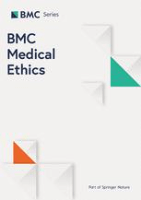
BMC Medical Ethics
Exploring the intersection of ethics and medicine.BMC Medical Ethics is a leading open-access journal dedicated to the critical exploration and dissemination of knowledge surrounding ethical issues in healthcare and medicine. Published by BMC, and headquartered in the United Kingdom, this journal has become a cornerstone in the field since its inception in 2000, with a remarkable focus on health policy, nursing ethics, and the complex legal aspects intertwining with healthcare practices. With an impressive Q1 ranking across multiple categories, including Health Policy and Health (Social Science), it ranks among the top journals globally—particularly notable with its Scopus rankings reflecting a strong 85th percentile in Nursing and an 81st percentile in Social Sciences. As an open-access publication, BMC Medical Ethics ensures that research findings are readily accessible, fostering a collaborative environment for researchers, practitioners, and students alike. The journal's commitment to ethical discourse not only advances academic inquiry but also shapes the practices and policies that govern healthcare delivery; thus, making it an invaluable resource for those engaged in the advancement of medical ethics.